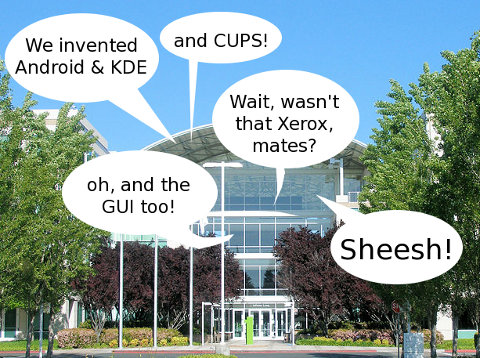05.30.10
Posted in Apple, GNU/Linux, Microsoft, Vista 7, Windows at 4:55 pm by Dr. Roy Schestowitz

Summary: Microsoft says goodbye to Expression Media
MICROSOFT’S list of dead products is growing rapidly. Once in a while, rather than kill a product or a division Microsoft just sells it to someone else (for better or for worse). One large and recent example would be Razorfish
This week’s news is that Microsoft Expression Media is no more. Microsoft lets it go. Coverage of this was quite extensive:
Here is Microsoft’s press release which PR Fried was dressing it up a bit:
Microsoft said on Tuesday it has unloaded its Expression Media photo catalog product, selling it to medium-format digital camera maker Phase One.
[...]
Microsoft said the deal was arranged by Microsoft’s IP Ventures unit, which licenses or sells technology that Microsoft decides is no longer strategic.
Microsoft is axing products at a high pace (decreasing the size of its portfolio). Attempts to make new products like Slate are failing for Microsoft [1, 2, 3] because Vista 7 is dropped (to be replaced by a Linux-based operating system). No wonder even Apple is worth more than Microsoft at this stage. Microsoft’s forecast just isn’t so encouraging, regardless of Microsoft’s size. █
Permalink
 Send this to a friend
Send this to a friend
Posted in Apple, GNU/Linux, Google at 1:31 am by Dr. Roy Schestowitz

Summary: Apple’s strong grip on its devices is driving developers away to Linux, which is flourishing in phones and tablets
STEVE “Freedom from Porn” Jobs has turned out not only to be blocking pornography but also competition. We are reminded of this thanks to a new article from The Register:
Mozilla won’t submit a Firefox browser to Apple’s iPhone App Store. It has no intention of taking its browser where “it’s not wanted.” But the open source outfit is developing an iPhone incarnation of Firefox Sync, the browser bookmark-syncing service formerly known as Weave.
Separately, The Register writes a new rant about the hypePad which, as expected, serves vanity needs more than practical uses.
As the iPad goes on sale in the UK (and eight other countries), I’ve had my own “magical and revolutionary” Apple tablet for exactly 56 days. And I’m using it less and less each day.
My fading relationship with my iPad reminds me of a long-ago college fling with a young lovely. High anticipation, fervent consummation, growing familiarization, decreasing fascination, and the inevitable: “No, hon, it’s not you. It’s me.”
As shown in our latest bundle of news, there are many tablets out there as new ones appear every week. An increasing number of those will run Linux on ARM and there is only one tablet which runs Apple’s operation system. As for Vista 7, it’s being dumped for Linux, at least on tablets [1, 2, 3].
Apple did not invent tablets and luckily it won’t control this market. Linux will do to Apple on tablets what it’s already doing to Apple on phones. █
Permalink
 Send this to a friend
Send this to a friend
05.28.10
Posted in Apple, Microsoft, Patents at 8:41 pm by Dr. Roy Schestowitz

Jobs does not soften with age
Summary: A collaborator of the MPEG cartel shows his disregard for culture and sympathy for Hollywood as well as patent trolls
“We’re in the era of digital video, and it’s a mess,” Steve Jobs once said. Right now it is Steve Jobs who is causing or at least adding to this mess.
As we pointed out before, Steve Jobs is an enemy of anything that’s available to people in places like Africa, where people are unable to buy licences from patent trolls such as MPEG-LA (never mind buying overpriced merchandise from Foxconn the company with the apple-shaped logo). Steve Jobs is interested in selling shiny toys, not in enabling people to access those things he calls “era of digital video” and “mess”. What a lovely guy. Pogson writes:
Google’s VP8 FLOSS video code and WebM file format are brewing a bit of a turf war and the old guard is circling the wagons around H264. There is an idea to add VP8 and WebM to HTML5. That would ensure that everyone with any browser or OS could use HTML5 properly but the old guard wants to make money from HTML5 by holding patents and charging licence fees to use a video codec.
We have already covered the subject in:
To say a little more:
In a perfect world, we would have no software patents and everyone would be capable of using the best technology available. However, for now, we will have to put up with these types of laws and patents. The best that could happen in the present scenario is one where MPEG-LA announces that the situation currently existing (till 2016) would be extended in perpetuity.
Isn’t it funny that Steve Jobs is sidling with the patent trolls, whereas Google is distancing itself from them? Wayne puts it like this: “The Enemy Of My Enemy Is My Enemy Or Why VP8 Is Important Even If It Came From Google”
This does not make Google our friend. Google didn’t do this for the consumer. Google did this for Google. The largest user of Flash video is this small site called YouTube, which curiously enough is owned by Google. That Google’s actions will do the consumers good is a byproduct of Google trying to make money. Google doesn’t really care about the consumer, it only cares about Google.
There’s been a lot of articles about VP8, from a variety of publishers, which can be found here, here, here, etc. Some of the most important ones were written by Dr. Roy at Techrights, who has my utmost thanks for all the research time he saved me.
But everyone seems to be missing something. What if VP8 becomes the de facto standard? Remember that VP8 is an open standard. Totally open. This means that adding DRM to it will be difficult, if not impossible. So VP8 kills off Windows Media Video (WMV) and Quicktime as a video standards, just like MP3 killed off Windows Media Audio (WMA) and Quicktime as audio standards. Remember that one of the reasons that Microsoft and Apple fought MP3 was because MP3 wasn’t compatible with DRM, and the Frauhoffer Institute controlled the specification. Now we have the same situation with VP8, and we already know that Steve Jobs is panicking. You have to ask yourself why…
Simple – VP8 will destroy the Digital Millennium Copyright Act, ACTA, the new Canadian Copyright Act, the WIPO copyright treaties, and every other law which attempts to protect DRM. The ripping noise you hear is Hollywood tearing it’s hair out in clumps.
And now you know why the patent trolls at MPEG.LA are trying to sidetrack VP8 adoption. Which still doesn’t make Google our friend. Remember that.
The MPEG cartel and Apple are not the only antisocial participants here; Microsoft too turned its back and it goes further by suing Salesforce without provocation that could somehow justify it.
“Salesforce says Microsoft suit could hurt profit,” states the headline of this new article from Reuters.
Salesforce.com Inc (CRM.N) said a recent lawsuit by Microsoft Corp (MSFT.O) could hurt Salesforce’s profits for one quarter, though the litigation is unlikely to derail the company’s overall financial health.
Microsoft filed a complaint on May 18, charging that Salesforce’s web-based software for managing sales activities infringes nine of its patents.
The software giant alleged that Salesforce.com was using its technology in software menus, toolbars and graphical interface features, as well as in the way that it obtains data from remote computers.
We have already covered this case in the posts below. Software patents are economically injurious. █
Permalink
 Send this to a friend
Send this to a friend
Posted in Apple, Free/Libre Software, FSF, GPL, KDE at 12:39 pm by Dr. Roy Schestowitz
“Why join the navy if you can be a pirate?”
–Steve Jobs

Summary: Apple’s hoarding of control continues now that WebKit™ (originally KDE codebase) becomes a project it can control even by name
EVERYONE’S MOST POPULAR sect technology company is all about sharing love and distributing code — so much so that the code it took from KDE some years ago (leading to a controversy because it had not committed to giving back) is not only maintained in state where it’s centralised under Apple (with Google increasingly participating too) but it’s also becoming a real ownership of Apple in the naming sense. Need companies start asking Apple for permission in order to use the word WebKit™, which roughly translates to “KHTML the Apple way”?
Apple files for WebKit browser trademark
WebKit, the open-source project behind Apple’s Safari browser, is a pretty obscure name to ordinary folks. And perhaps Apple wants to keep it that way, judging by Apple’s May 18 WebKit trademark application.
Now that Apple is under fire for GPL violations (as stated by the FSF, which wishes to prevent Apple from illegally using GNU code against GNU itself), one ought to (re)think about Apple’s role in Free/Open Source software — code which worked pretty well for Apple, as long it ‘consumed’ and gave little or nothing in return. █
“Theres always a group of people that wants to undo the forces of industry that have given us so much in terms of wealth, and theres always people who want things to be free. The open-source movement starts with those sort of people. But it still has such good points that have nothing to do with whether its free or not. The idea of developing something and then making your solution known. Spread the information so the world can grow from it.”
–Steve Wozniak, Apple co-founder, 2007
Permalink
 Send this to a friend
Send this to a friend
Posted in Apple, GPL at 4:37 am by Dr. Roy Schestowitz

Summary: The selfish, greedy side of Apple and what it means to people’s freedom
• DOJ inquires about Apple’s hold on digital music [via]
The U.S. Department of Justice has begun asking questions about Apple’s role in the recent scaling back of special music discounts and promotions at Amazon, according to two high level music industry sources.
• FSF: Apple’s iTunes Store terms of service at odds with GPL
The Free Software Foundation is up in arms over Apple’s iTunes Store Terms of Service, suggesting that these terms fundamentally conflict with the terms of the GNU Public License. The foundation has warned Apple that a version of GNU Go distributed by the App Store makes Apple liable to comply with GPL terms that allow free sharing of code, but warned that its “Usage Rules” violate those terms. The fallout could potentially affect any app that uses GPLed code.
• Apple’s GPL Snafu and Opportunity
Apple is finding itself on wrong end of the Free Software Foundation (FSF). An iPhone port of GNU Go has made its way into the App Store, which is all good — except that the terms of the App Store conflict with the GNU General Public License.
• Death by Foxconn
Foxconn is the largest contract manufacturer in China and the world, making products notably for Apple and for other American companies, too. The company has been in the news lately because of very public worker suicides by jumping from the factory roof.
Were these people worked to death? Were they worked insane? In one case was the suicide the result of a suspected leak of Apple intellectual property? What kind of sweat shop is Foxconn, anyway?
I don’t know and nether do you. What we do know is the annual suicide rate per 100,000 people in China is about 13.5, with slightly more women than men taking their own lives (the only major country where that is the case, by the way). That means the Foxconn factory, with 300,000 workers, ought to be experiencing almost 40 suicides per year, while the reported numbers are a lot less than that.
Permalink
 Send this to a friend
Send this to a friend
05.27.10
Posted in Apple, Finance, Free/Libre Software, Microsoft at 10:48 am by Dr. Roy Schestowitz
“We’ve always been shameless about stealing great ideas.”
–Steve Jobs, Apple
Summary: The copycat/copyright marketing machine known as “Apple” need not be commended for a milestone achievement, which is only additional threat to people’s freedom
SEVERAL people have sent us the news about Apple leapfrogging Microsoft in terms of market cap [1, 2]. Is that good news at all? We suspect not. Apple — just like Microsoft — is suing GNU/Linux and trashing people’s freedom, even basic rights.
Well, guess what? Apple is not only the company that copied many ideas from Free software (and infringes on software patents owned by several Linux distributors). Apple is now being accused by the FSF of violating the GPL (official statement available in Arabic and other languages too).
An iPhone port of GNU Go is currently being distributed through Apple’s App Store. However, this distribution is not in compliance with the GNU GPL. The primary problem is that Apple imposes numerous legal restrictions on use and distribution of GNU Go through the iTunes Store Terms of Service, which is forbidden by section 6 of GPLv2. So today we have written to Apple and asked them to come into compliance. We would be happy to see Apple distribute these programs under the GPL’s terms, but unfortunately, it seems much more likely that they’ll simply make the problem go away by removing GNU Go from the App Store.
There are many other Apple violations, but this post is not intended to exhaustively cover them (we have better listing in the Wiki). A reader wrote to us last night about “hypePhone and Sony Death Trap.”
“Conditions in these sweat shops [are] unlivable.”
–Techrights readerOur reader continued: “From Daily Rotten [originally here]: “A ninth employee killed himself Tuesday at the Chinese electronics supplier Foxconn, which makes the Apple iPad and Sony Ericsson phones, turning attention to working conditions at the firm’s huge complex… Workers are required to stand at fast-moving assembly lines for eight hours without a break and without talking… The basic starting pay of $130 a month — barely enough to live on — can be augmented to a more respectable $295 only by working 30 hours overtime a week.”
“So, it’s official,” said our reader. “Conditions in these sweat shops [are] unlivable.” See this page about Microsoft’s sweatshops as well.
Speaking of the hypePhone, a new vulnerability has just been found which Linux takes advantage of:
A lost iPhone is a bigger problem than previously thought. Despite encryption the finder can gain easy access to data including photos and audio recordings, even if the owner has set up their iPhone to require a pass code. And, of all things, this is made possible with Linux – the very operating system which Apple regularly cold-shoulders.
Pogson writes:
Apple Insecurity
[...]
Yet another reason to use GNU/Linux, an OS designed by geeks for performance. Carpet bombing self is not performance, Steve.
The title, “Apple Insecurity”, has two possible interpretations. Apple is very afraid that its clients will attain a level of control. They are treated like children and slaves (probably more so than Microsoft’s customers), but the funny thing is that many of them accept it quietly. One day they might wake up only to smell the consequence of their apathy — an apathy that also jeopardizes their neighbours’ freedom.
The goal is NOT to eliminate Microsoft. The goal is to promote software freedom.
For defeatists who believe that Linux fell behind the competition, well… how come it replaces Vista 7 and surpasses hypePhone? [via]
(On Friday, Digitimes [5] quoted an HP Taiwan exec saying the Slate would use WebOS instead of Windows 7.)
Software freedom everywhere is an attainable goal. Let’s not lose sight of it. Let’s play for behaviour, not brand names. █
Permalink
 Send this to a friend
Send this to a friend
05.26.10
Posted in Apple, DRM, Europe, GNU/Linux, Google at 1:00 pm by Dr. Roy Schestowitz

Summary: “Apple has been outflanked by Google’s multi-vendor strategy, outsold in new unit sales, and is now outgunned in technology and user-visible features,” says a well-known Open Source figure
MR. Eric Raymond has just argued that it’s a “bad time to be an Apple fanboy”. Apple’s latest despicable moves are a subject we wrote about this morning and Apple is not even winning against Linux. In fact, it has actually alienated many of those so-called ‘fanboys’. Raymond ends his post with the following statement:
I’m not going to count off the rest of the feature list here, because I want to focus on the larger picture. Apple has been outflanked by Google’s multi-vendor strategy, outsold in new unit sales, and is now outgunned in technology and user-visible features. Again, I was expecting this…but not so soon.
Now is a good time to point out the embarrassment that we have in the UK, namely that elected officials decided to acquire some of the most draconian products ever to exist and to give them to people who run the country. What an utterly bad example to be setting, never mind the issue of cost (the cost of freedom is vastly higher than Apple’s generic devices that are assembled by children in Chinese sweatshops).
From The Times:
MEPs get £4m taste for Apple iPad
[...]
Marta Andreasen, the UKIP member who sits on the budget committee, said: “We were told the iPads would actually cut costs as they are not expensive and that we would be able to stay connected while outside the office or on holidays, but many of the older MEPs don’t even know how to use the internet properly.
“I am against that because it seems completely unnecessary, especially when European taxpayers are facing such difficult times.”
A parliament spokeswoman denied that there were plans to obtain iPads for MEPs in the “immediate future” and said she was not familiar with the bureau initiative.
Why would anyone want to promote a technology cult inside parliament, and one that puts control in the hands of a foreign company with its own secret digital locks, kill switches, and potentially back doors? Ideally, parliament should assemble computers with exchangeable parts (it’s not hard to do these days) and put on them free code which it can inspect, control, enhance, and share with the public too. This free code is some of the best which is out there and it’s always improving. █
Permalink
 Send this to a friend
Send this to a friend
Posted in Apple, Google, Microsoft at 5:17 am by Dr. Roy Schestowitz
“Advertising is far from impotent or harmless; it is not a mere mirror image. Its power is real, and on the brink of a great increase. Not the power to brainwash overnight, but the power to create subtle and real change. The power to prevail.”
–Eric Clark
Summary: Now that the AdMob acquisition is approved, Tricia Duryee says that “Microsoft won’t have a chance to buy the largest mobile advertising network”
Google has been fighting to gain more control with the AdMob deal and this fight pays off at the end as barriers are dropped [1, 2, 3] and Google is expected to swallow another company.
According to the FTC’s statement, evidence gathered by the agency raised important questions about the transaction. Google and AdMob have competed head-to-head for the past few years, with a notable increase in intensity during the past year. This competition has spurred innovation and allowed mobile publishers to keep a large share of the revenue generated from the sale of their ad space. The companies also have economies of scale that give them a major advantage over smaller rivals in the business, the statement says.
These concerns, however, were outweighed by recent evidence that Apple is poised to become a strong competitor in the mobile advertising market, the FTC’s statement says. Apple recently acquired Quattro Wireless and used it to launch its own iAd service. In addition, Apple can leverage its close relationships with application developers and users, its access to a large amount of proprietary user data, and its ownership of iPhone software development tools and control over the iPhone developers’ license agreement.
Worth paying attention to is the “proprietary user data” which Apple is mentioned for. Here is the response from the American Antitrust Institute (AAI):
The Federal Trade Commission’s (FTC) decision not to challenge Google’s acquisition of AdMob is understandable given the nascent and changing nature of the mobile advertising market and Apple’s emergence as a likely formidable competitor in this market. The American Antitrust Institute (AAI) agrees with the FTC’s conclusion that, particularly as a result of Apple’s recent actions, current market shares are unlikely to be an accurate predictor of future market shares or whether the Google/AdMob combination will be able to exercise market power. Indeed, press reports indicate that Apple’s licensing agreements with iPhone application developers may prevent developers from using competing mobile ad networks.
One Microsoft blog characterises this as a preparation for competition between Google (Android/Linux) and Apple (hypePhone). Tricia Duryee says that it “paves way for Microsoft to make a move in mobile advertising”:
There’s one thing for sure now: Microsoft (NSDQ: MSFT) won’t have a chance to buy the largest mobile advertising network now that Google (NSDQ: GOOG) has received approval to go-ahead with its $750 million acquisition of AdMob.
We already understand how Google harms Microsoft’s monopoly and there is suspicion that Google and Apple might replace Microsoft one day.
Google landed some big hits against Apple yesterday at their I/O developer conference. Reading through the narrative coverage, you’d think they were the only two companies that matter, which leads me to ask, whatever happened to Microsoft?
Apple and Microsoft are in turn threatening with software patents, which are the biggest threat to software freedom. Google’s threat to freedom is different in nature. █
Permalink
 Send this to a friend
Send this to a friend
« Previous Page — « Previous entries « Previous Page · Next Page » Next entries » — Next Page »























 Content is available under CC-BY-SA
Content is available under CC-BY-SA